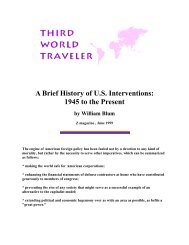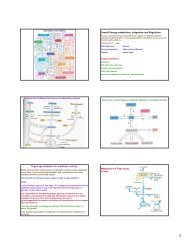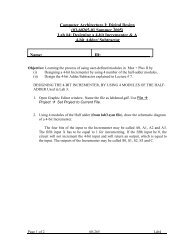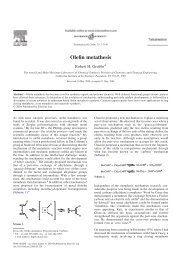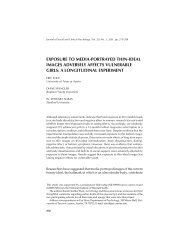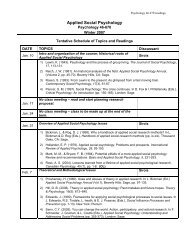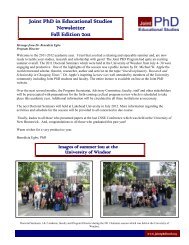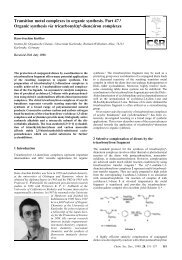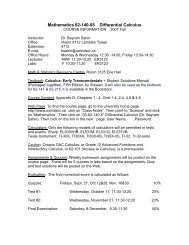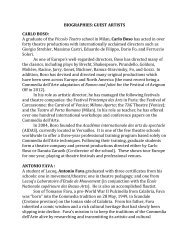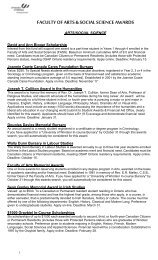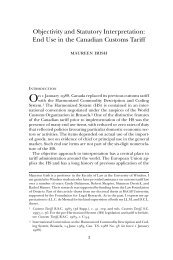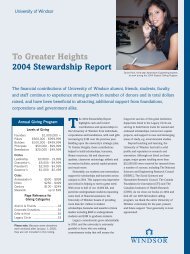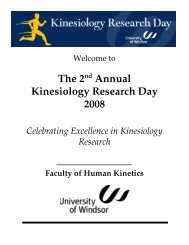Critical Social Work - University of Windsor
Critical Social Work - University of Windsor
Critical Social Work - University of Windsor
You also want an ePaper? Increase the reach of your titles
YUMPU automatically turns print PDFs into web optimized ePapers that Google loves.
Brown<br />
arise through human interaction. Language acts as symbols or signifiers <strong>of</strong> the objectivated world<br />
simultaneously creating and reinforcing taken for granted realities (Berger & Luckman, 1966).<br />
Not only does language make shared meaning possible, humans see what language and concepts<br />
permit them to see. Although language and knowledge are not synonymous, they have mutually<br />
influencing characteristics.<br />
What is critical for anti-oppressive discourse is the idea that human life is inseparable<br />
from meaning, and meaning is in a constant process <strong>of</strong> becoming, which humans are both<br />
creators <strong>of</strong> and created by; while material reality may exist outside human activity, all social life<br />
is inseparable from meaning making processes. As such, meaning is always multiple, political,<br />
and contestable. The knowledge <strong>of</strong> this allows us to see that alternative less oppressive social<br />
realities are always possible, and that meaning is not static or fixed. <strong>Social</strong> life <strong>of</strong>ten produces<br />
dominant realities that are treated as though they were real in and <strong>of</strong> themselves, and that do not<br />
reflect the interests <strong>of</strong> all. Anti-oppression discourse is sharply aware that its task is not only to<br />
challenge falsely universalized realities, but to resurrect marginalized and alternative knowledge.<br />
A dynamic process constitutes the way we participate in making sense <strong>of</strong> our lives.<br />
Individuals are active participants in the creation <strong>of</strong> their stories; however, these stories draw<br />
upon available social discourses and thus consist <strong>of</strong> both subjugated and dominant knowledge.<br />
As our lived experiences exist within a field or web <strong>of</strong> power and knowledge, no story is outside<br />
power (White & Epston, 1990). No telling or hearing <strong>of</strong> a story is outside the social construction<br />
<strong>of</strong> meaning and, therefore, neutrality is not possible (White, 1989a, 1989b, 1989c). Power is<br />
reconceptualized not as something possessed but something constructed and socially organized<br />
and enacted through everyday mechanisms <strong>of</strong> power including discourse (Brown, 2007b; Fook<br />
& Morley, 2005; Foucault, 1980a, 1980b; Hick, 2005; White, 2001, 2007). If we understand the<br />
social world as socially constructed it is theoretically and politically congruous to adopt a<br />
constructionist approach to the self, subjectivity, and experience. Experience is then discursive,<br />
socially constructed, historically located, and interpretive. From this perspective, self-stories<br />
cannot be inherently “truer” than other stories. There can be no self-legitimizing stories.<br />
Narratives are constructed through a selective process about which information to include and<br />
which to leave out. In this selective process much goes untold, and no story is able encompass<br />
the richness <strong>of</strong> experience, its gaps and contradictions. <strong>Social</strong> workers on the side <strong>of</strong> social<br />
justice cannot take a neutral stance to either truth claims or power (Brown, 2003; White, 1994;<br />
White & Epston, 1990). Thus practitioners must actively unpack and reconstruct oppressive<br />
stories, and in so doing, the power relations embedded within them (Brown, 2003; 2007a, 2011;<br />
Fook, 2002, White, 2001; White & Epston, 1990). This means that we cannot adopt a neutral<br />
stance to these stories, but must help unpack them in order to create less oppressive stories,<br />
which then means that we are to take a position when we hear clients’ stories. We are likely to<br />
reframe clients’ stories through our own positioned and preferred narratives. The binary<br />
construction <strong>of</strong> the expert authorative first voice <strong>of</strong> the oppressed or clients and the social<br />
workers’ disingenious ‘not knowing’, depoliticized lack <strong>of</strong> position which mimics neutrality are<br />
problematic (Brown, 2007). Anti-oppressive social work in this sense must involve the deliberate<br />
shifting <strong>of</strong>, oppressive, and <strong>of</strong>ten, hegemonic discourses. This means that we cannot take up<br />
stories <strong>of</strong> experience as “truth”, but as stories that have arisen within culture. If we wish to<br />
understand the political nature <strong>of</strong> experience it is necessary to situate it within the social context<br />
in which it is produced. From a critically reflexive epistemological stance, anti-oppressive<br />
<strong>Critical</strong> <strong>Social</strong> <strong>Work</strong>, 2012 Vol. 13, No. 1<br />
46



